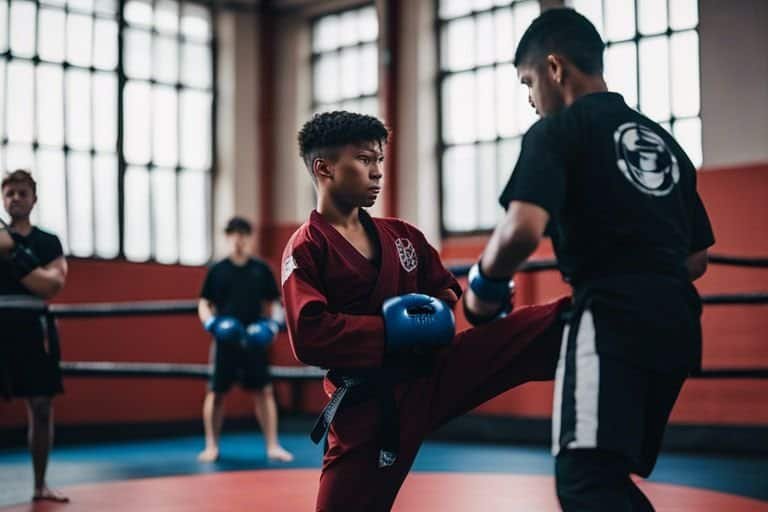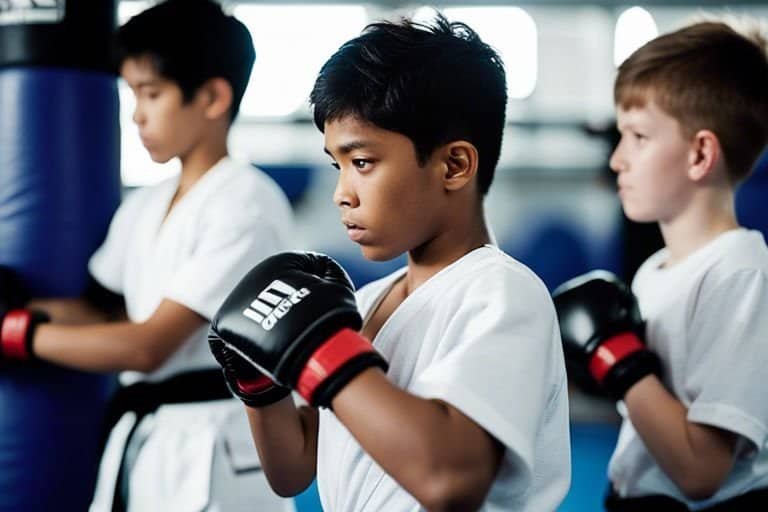Engaging in martial arts at a young age can profoundly benefit kids and teenagers by not only teaching them self-defense skills, but also by enhancing their focus, discipline, and self-control. MMA (Mixed Martial Arts) is an effective way for young individuals to develop physical and mental strength, as well as valuable life skills that will benefit them in and out of the gym.
Key Takeaways:
- Enhances Focus: Learning MMA requires concentration and focused attention, which can help kids and teenagers improve their attention span and ability to stay focused in other areas of their lives.
- Builds Discipline: MMA training instills discipline as students learn to follow rules, respect their instructors, and maintain a consistent practice schedule, which can positively impact their behavior and outlook on life.
- Promotes Self-Control: By teaching students to manage their emotions, impulses, and reactions, MMA empowers kids and teenagers to develop greater self-control, leading to improved decision-making and conflict resolution skills.

Physical Benefits of MMA Training
One of the many reasons why learning MMA is great for kids and teenagers is the myriad of physical benefits that come with the training. These benefits not only contribute to overall physical health, but also enhance focus, discipline, and self-control.
Enhancing Physical Fitness and Coordination
Physical fitness and coordination are essential for children and teenagers to develop as they grow. Participating in MMA training helps improve cardiovascular health, strength, and flexibility. The varied techniques and movements involved in MMA training, such as striking, grappling, and footwork, promote the development of overall body coordination and agility. Additionally, these physical activities also help in muscle development and endurance, which are crucial for a healthy lifestyle.
The physical fitness and coordination gained through MMA training can also have a positive impact on other areas of a child’s life, such as improved performance in other sports and activities, as well as a boost in confidence and self-esteem.
Improving Reflexes and Reaction Times
The fast-paced nature of MMA training helps in improving reflexes and reaction times. Through regular practice of striking drills, sparring, and defensive maneuvers, practitioners are able to enhance their ability to react quickly to different situations, as well as develop sharp reflexes. This is particularly beneficial for kids and teenagers, as it not only improves their physical abilities but also teaches them to think on their feet and make quick decisions in high-pressure situations.
Plus, improved reflexes and reaction times gained through MMA training can also be applied to various aspects of a child’s life, including academic performance, social interactions, and overall safety awareness.

Mental and Emotional Advantages
While physical prowess and self-defense skills are key aspects of learning MMA, the mental and emotional benefits for kids and teenagers are equally significant. Engaging in MMA training can have a profound impact on their focus, discipline, and self-control, which are vital for their overall development.
Building Focus and Discipline Through Training
Building focus and discipline through MMA training involves honing the ability to concentrate on the task at hand, whether it’s mastering a new technique or adhering to the rigorous training regimen. As children and teenagers set goals, track their progress, and strive to improve, they learn the value of discipline and perseverance. This not only contributes to their growth as martial artists but also translates to various aspects of their personal and academic lives, instilling a strong work ethic and a resilient mindset.
Moreover, the structured nature of MMA classes, with set routines and rules, fosters a sense of discipline and respect for authority. By following instructions from their coaches and abiding by the regulations of the sport, young practitioners develop a heightened sense of responsibility and self-discipline, which are indispensable traits in their formative years.
Cultivating Self-Control and Decision-Making Skills
Mental fortitude is a key component of MMA training, as it requires participants to remain composed and focused under high-pressure situations. Through sparring sessions and drills, youngsters learn to manage their emotions and maintain self-control even in the face of adversity, which can greatly benefit their emotional resilience and mental well-being.
For instance, in a heated exchange during a sparring match, a student must make split-second decisions, weighing the risks and benefits of their actions, illustrating the intricate connection between MMA and enhanced decision-making skills. This ability to think critically and act judiciously can serve them well in various real-life scenarios, promoting self-assuredness and strategic thinking.
Social and Behavioral Improvements
Your child’s participation in MMA can lead to significant social and behavioral improvements. The discipline and respect instilled in MMA training can positively impact their interactions with others, both inside and outside of the gym. These improvements can have a lasting and profound effect on their personal development.
Fostering Teamwork and Respect Among Peers
To thrive in MMA, students must learn to work together as a team, respecting each other’s strengths and supporting one another’s weaknesses. This camaraderie creates a sense of belonging and encourages positive social behavior. In addition, the respectful nature of MMA training promotes a culture of mutual respect among peers, fostering an environment where everyone feels valued and appreciated.
The Role of MMA in Preventing Bullying
Any child who learns MMA is equipped with the physical and mental tools to handle bullying situations with confidence and composure. They develop the self-assurance and self-control to navigate potential confrontations and, if necessary, defend themselves in a safe and controlled manner. *Behavioral* problems such as aggression or impulsive behavior are significantly reduced as a result.
Safe Practices in MMA for Young Learners
Now that we understand the benefits of learning MMA for kids and teenagers, it’s important to ensure that their training environment is safe and conducive to their development. Implementing safe practices in MMA for young learners is crucial for their physical and mental well-being.
Understanding Age-Appropriate Training Techniques
Understanding the physical and cognitive development of children and teenagers is essential in designing age-appropriate training techniques in MMA. Young learners should focus on developing fundamental movement skills, such as balance, coordination, and agility, before progressing to more complex techniques. It is imperative for coaches and trainers to tailor their instruction to the individual needs and abilities of each student, ensuring that they are not pushed beyond their physical capabilities. Emphasizing proper technique over intensity is vital to prevent injuries and promote long-term growth and success in MMA for young practitioners.
Preventing Injuries: Guidelines for Parents, Coaches, and Practitioners
Injuries are a common concern in any contact sport, and it is no different in MMA. Parents, coaches, and practitioners all play a significant role in preventing injuries in young learners. Proper supervision, adequate protective gear, and regular safety checks of the training environment are essential for minimizing the risk of injuries. Coaches and trainers should also be well-versed in recognizing signs of overtraining and burnout in young athletes, adjusting training loads and schedules accordingly. Open communication between parents, coaches, and practitioners is imperative to ensure the well-being of young learners in MMA.
Parents play a crucial role in ensuring that their children are training in a safe and supportive environment. They should communicate openly with coaches about any concerns or limitations their child may have, and advocate for their child’s safety and well-being. Coaches and practitioners, on the other hand, should prioritize proper warm-ups, cool-downs, and injury prevention exercises in their training programs, setting a strong foundation for young learners to enjoy a safe and fulfilling experience in MMA.
FAQ
Q: What are the benefits of kids and teenagers learning MMA?
A: Kids and teenagers can benefit from learning MMA by enhancing their focus, discipline, and self-control. MMA training helps them develop physical and mental strength, as well as emotional resilience.
Q: How does learning MMA enhance focus in kids and teenagers?
A: MMA requires a high level of concentration and focus during training and sparring. This helps kids and teenagers improve their attention span, reaction time, and the ability to stay present in the moment.
Q: In what ways does MMA training promote discipline among kids and teenagers?
A: MMA training instills a sense of structure and routine, teaching kids and teenagers the importance of commitment, hard work, and perseverance. They learn to follow rules, respect their instructors, and stay dedicated to their practice.
Q: How does MMA teach self-control to kids and teenagers?
A: Through MMA training, kids and teenagers learn to manage their impulses, emotions, and aggression in a controlled and respectful manner. They understand the power of restraint and gain a deeper sense of self-awareness.
Q: Are there any additional benefits of learning MMA for kids and teenagers?
A: Yes, apart from focus, discipline, and self-control, MMA training also helps kids and teenagers improve their physical fitness, self-confidence, and social skills. It teaches them valuable self-defense techniques and promotes a healthy lifestyle.



